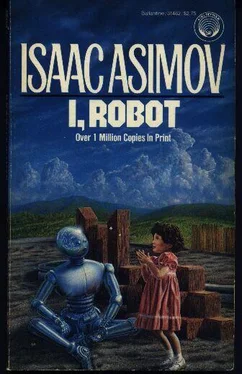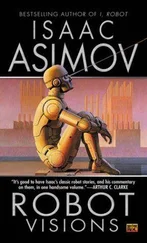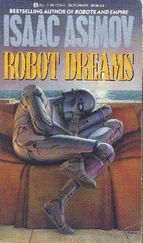Isaac Asimov - I, Robot
Здесь есть возможность читать онлайн «Isaac Asimov - I, Robot» весь текст электронной книги совершенно бесплатно (целиком полную версию без сокращений). В некоторых случаях можно слушать аудио, скачать через торрент в формате fb2 и присутствует краткое содержание. Жанр: Фантастика и фэнтези, на английском языке. Описание произведения, (предисловие) а так же отзывы посетителей доступны на портале библиотеки ЛибКат.
- Название:I, Robot
- Автор:
- Жанр:
- Год:неизвестен
- ISBN:нет данных
- Рейтинг книги:5 / 5. Голосов: 2
-
Избранное:Добавить в избранное
- Отзывы:
-
Ваша оценка:
- 100
- 1
- 2
- 3
- 4
- 5
I, Robot: краткое содержание, описание и аннотация
Предлагаем к чтению аннотацию, описание, краткое содержание или предисловие (зависит от того, что написал сам автор книги «I, Robot»). Если вы не нашли необходимую информацию о книге — напишите в комментариях, мы постараемся отыскать её.
I, Robot — читать онлайн бесплатно полную книгу (весь текст) целиком
Ниже представлен текст книги, разбитый по страницам. Система сохранения места последней прочитанной страницы, позволяет с удобством читать онлайн бесплатно книгу «I, Robot», без необходимости каждый раз заново искать на чём Вы остановились. Поставьте закладку, и сможете в любой момент перейти на страницу, на которой закончили чтение.
Интервал:
Закладка:
Isaac Asimov
I, Robot
Introduction
I LOOKED AT MY NOTES AND I DIDN'T LIKE THEM. I'd spent three days at U. S. Robots and might as well have spent them at home with the Encyclopedia Tellurica.
Susan Calvin had been born in the year 1982, they said, which made her seventy-five now. Everyone knew that. Appropriately enough, U. S. Robot and Mechanical Men, Inc. was seventy-five also, since it had been in the year of Dr. Calvin's birth that Lawrence Robertson had first taken out incorporation papers for what eventually became the strangest industrial giant in man's history. Well, everyone knew that, too.
At the age of twenty, Susan Calvin had been part of the particular Psycho-Math seminar at which Dr. Alfred Lanning of U. S. Robots had demonstrated the first mobile robot to be equipped with a voice. It was a large, clumsy unbeautiful robot, smelling of machine-oil and destined for the projected mines on Mercury. But it could speak and make sense.
Susan said nothing at that seminar; took no part in the hectic discussion period that followed. She was a frosty girl, plain and colorless, who protected herself against a world she disliked by a masklike expression and a hypertrophy of intellect. But as she watched and listened, she felt the stirrings of a cold enthusiasm.
She obtained her bachelor's degree at Columbia in 2003 and began graduate work in cybernetics.
All that had been done in the mid-twentieth century on "calculating machines" had been upset by Robertson and his positronic brain-paths. The miles of relays and photocells had given way to the spongy globe of plantinumiridium about the size of a human brain.
She learned to calculate the parameters necessary to fix the possible variables within the "positronic brain"; to construct "brains" on paper such that the responses to given stimuli could be accurately predicted.
In 2008, she obtained her Ph.D. and joined United States Robots as a "Robopsychologist," becoming the first great practitioner of a new science. Lawrence Robertson was still president of the corporation; Alfred Lanning had become director of research.
For fifty years, she watched the direction of human progress change and leap ahead.
Now she was retiring – as much as she ever could. At least, she was allowing someone else's name to be inset upon the door of her office.
That, essentially, was what I had. I had a long list of her
published papers, of the patents in her name; I had the
chronological details of her promotions. In short I had her
professional "vita" in full detail.
But that wasn't what I wanted.
I needed more than that for my feature articles for Interplanetary Press. Much more.
I told her so.
"Dr. Calvin," I said, as lushly as possible, "in the mind of the public you and U. S. Robots are identical. Your retirement will end an era and-"
"You want the human-interest angle?" She didn't smile at me. I don't think she ever smiles. But her eyes were sharp, though not angry. I felt her glance slide through me and out my occiput and knew that I was uncommonly transparent to her; that everybody was.
But I said, "That's right."
"Human interest out of robots? A contradiction."
"No, doctor. Out of you."
"Well, I've been called a robot myself. Surely, they've told you I'm not human."
They had, but there was no point in saying so.
She got up from her chair. She wasn't tall and she looked frail. I followed her to the window and we looked out.
The offices and factories of U. S. Robots were a small city; spaced and planned. It was flattened out like an aerial photograph.
"When I first came here," she said, "I had a little room in a building right about there where the fire-house is now." She pointed. "It was torn down before you were born. I shared the room with three others. I had half a desk. We built our robots all in one building. Output – three a week. Now look at us."
"Fifty Years," I hackneyed, "is a long time."
"Not when you're looking back at them," she said. "You wonder how they vanished so quickly."
She went back to her desk and sat down. She didn't need expression on her face to look sad, somehow.
"How old are you?" she wanted to know.
"Thirty-two," I said.
"Then you don't remember a world without robots. There was a time when humanity faced the universe alone and without a friend. Now he has creatures to help him; stronger creatures than himself, more faithful, more useful, and absolutely devoted to him. Mankind is no longer alone. Have you ever thought of it that way?"
"I'm afraid I haven't. May I quote you?"
"You may. To you, a robot is a robot. Gears and metal; electricity and positrons. Mind and iron! Human-made! It necessary, human-destroyed! But you haven't worked with them, so you don't know them. They're a cleaner better breed than we are."
I tried to nudge her gently with words, "We'd like to hear some of the things you could tell us; get your views on robots. The Interplanetary Press reaches the entire Solar System. Potential audience is three billion, Dr. Calvin. They ought to know what you could tell them on robots."
It wasn't necessary to nudge. She didn't hear me, but she was moving in the right direction.
"They might have known that from the start. We sold robots for Earth-use then – before my time it was, even. Of course, that was when robots could not talk. Afterward, they became more human and opposition began. The labor unions, of course, naturally opposed robot competition for human jobs, and various segments of religious opinion had their superstitious objections. It was all quite ridiculous and quite useless. And yet there it was."
I was taking it down verbatim on my pocket-recorder, trying not to show the knuckle-motions of my hand. If you practice a bit, you can get to the point where you can record accurately without taking the little gadget out of your pocket.
"Take the case of Robbie," she said. "I never knew him. He was dismantled the year before I joined the company – hopelessly out-of-date. But I saw the little girl in the museum-"
She stopped, but I didn't say anything. I let her eyes mist up and her mind travel back. She had lots of time to cover.
"I heard about it later, and when they called us blasphemers and demon-creators, I always thought of him. Robbie was a non-vocal robot. He couldn't speak. He was made and sold in 1996. Those were the days before extreme specialization, so he was sold as a nursemaid-"
"As a what?"
"As a nursemaid-"
Robbie
"NINETY-EIGHT – NINETY-NINE – ONE HUNDRED." Gloria withdrew
her chubby little forearm from before her eyes and stood for a moment,
wrinkling her nose and blinking in the sunlight. Then, trying to watch in all directions at once, she withdrew a few cautious steps from the tree against which she had been leaning.
She craned her neck to investigate the possibilities of a clump of bushes to the right and then withdrew farther to obtain a better angle for viewing its dark recesses. The quiet was profound except for the incessant buzzing of insects and the occasional chirrup of some hardy bird, braving the midday sun.
Gloria pouted, "I bet he went inside the house, and I've told him a million times that that's not fair."
With tiny lips pressed together tightly and a severe frown crinkling her forehead, she moved determinedly toward the two-story building up past the driveway.
Too late she heard the rustling sound behind her, followed by the distinctive and rhythmic clump-clump of Robbie's metal feet. She whirled about to see her triumphing companion emerge from hiding and make for the home-tree at full speed.
Gloria shrieked in dismay. "Wait, Robbie! That wasn't fair, Robbie! You promised you wouldn't run until I found you." Her little feet could make no headway at all against Robbie's giant strides. Then, within ten feet of the goal, Robbie's pace slowed suddenly to the merest of crawls, and Gloria, with one final burst of wild speed, dashed pantingly past him to touch the welcome bark of home-tree first.
Читать дальшеИнтервал:
Закладка:
Похожие книги на «I, Robot»
Представляем Вашему вниманию похожие книги на «I, Robot» списком для выбора. Мы отобрали схожую по названию и смыслу литературу в надежде предоставить читателям больше вариантов отыскать новые, интересные, ещё непрочитанные произведения.
Обсуждение, отзывы о книге «I, Robot» и просто собственные мнения читателей. Оставьте ваши комментарии, напишите, что Вы думаете о произведении, его смысле или главных героях. Укажите что конкретно понравилось, а что нет, и почему Вы так считаете.








